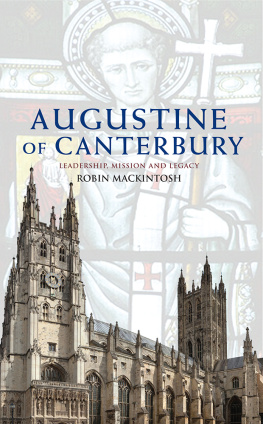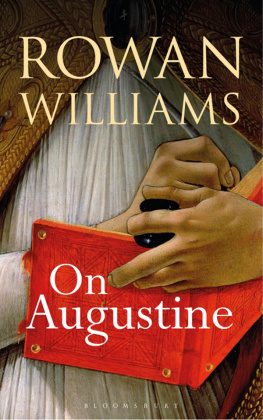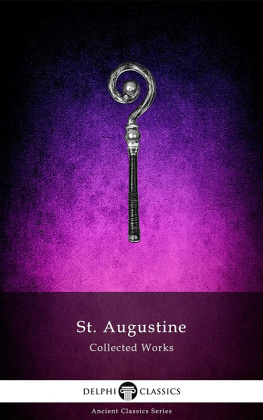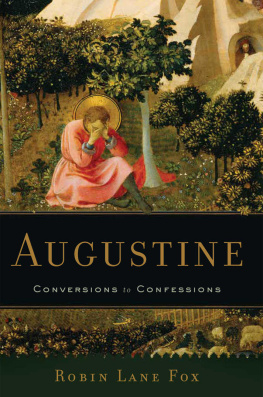Robin Mackintosh - Augustine of Canterbury: Leadership, Mission and Legacy
Here you can read online Robin Mackintosh - Augustine of Canterbury: Leadership, Mission and Legacy full text of the book (entire story) in english for free. Download pdf and epub, get meaning, cover and reviews about this ebook. year: 2013, genre: Religion. Description of the work, (preface) as well as reviews are available. Best literature library LitArk.com created for fans of good reading and offers a wide selection of genres:
Romance novel
Science fiction
Adventure
Detective
Science
History
Home and family
Prose
Art
Politics
Computer
Non-fiction
Religion
Business
Children
Humor
Choose a favorite category and find really read worthwhile books. Enjoy immersion in the world of imagination, feel the emotions of the characters or learn something new for yourself, make an fascinating discovery.
- Book:Augustine of Canterbury: Leadership, Mission and Legacy
- Author:
- Genre:
- Year:2013
- Rating:4 / 5
- Favourites:Add to favourites
- Your mark:
- 80
- 1
- 2
- 3
- 4
- 5
Augustine of Canterbury: Leadership, Mission and Legacy: summary, description and annotation
We offer to read an annotation, description, summary or preface (depends on what the author of the book "Augustine of Canterbury: Leadership, Mission and Legacy" wrote himself). If you haven't found the necessary information about the book — write in the comments, we will try to find it.
Augustine of Canterbury: Leadership, Mission and Legacy — read online for free the complete book (whole text) full work
Below is the text of the book, divided by pages. System saving the place of the last page read, allows you to conveniently read the book "Augustine of Canterbury: Leadership, Mission and Legacy" online for free, without having to search again every time where you left off. Put a bookmark, and you can go to the page where you finished reading at any time.
Font size:
Interval:
Bookmark:
There is a growing body of writing concerning the periphery of the Augustinian mission to Kent in AD 5967; however, much less attention has been devoted to the leadership that Augustine exercised, the nature and development of his mission to the Anglo-Saxon people, or the spirituality that energized this enterprise. Most studies leave Canterburys first archbishop too deeply obscured in the shadow of Gregory the Great for his own contribution to be clearly seen. This book explores the events that led to Augustines mission and how it was carried out, the immediate outcomes in Kent and Augustines attempts to build a bridge to the British Church. Critical leadership issues are considered as they arose at each stage of the mission. The spirituality that energized the mission is assessed.
A second aim is to bring together insights from recent historical, archaeological and sociological studies that have a bearing on both Augustines mission and context in the world of Late Antiquity, Anglo-Saxon England and sub-Roman Britain. It might be possible to uncover a more coherent narrative relating to Augustines mission so that Augustines own role and contribution can emerge more clearly. This could also make richer and wider use of existing material in imaginative ways for exploring implications for our present generation.
This leads to a third aim to recover insights into the inner spiritual DNA of Augustines leadership-for-mission and consider what implications this might have for the Church in the twenty-first century.
A final purpose is to challenge the basis for a negative interpretation of both Augustine and his contribution to the Kentish mission itself. This begins with, but is not restricted to, Bede. To what extent is a negative stance justified? The revival of interest in things Celtic in the last 100 years has cast almost any discourse relating to Augustine as self-evidently Roman, bad; Celtic, good; Augustine austere and hierarchical; Aidan and Cuthbert world-affirming and non-hierarchical; the Synod of Whitby, a triumph for Wilfrid the Romanizer but a disaster for the Church in Northumbria and particularly for Celtic Christianity. That these discourses are still played out more than 1400 years after the events themselves is regrettable, and the underlying discourses at the least need re-examination.
The Venerable Bede (c. 673735)
Almost everything we know about Augustine comes from or through Bede, a Northumbrian born after the Synod of Whitby in 664, and the letters of Pope Gregory the Great, who commissioned Augustine for the mission to the Angli . Bede as a young boy entered the monastery of Monkwearmouth-Jarrow, established by a Northumbrian nobleman, Benedict Biscop. Biscop travelled extensively on the Continent assembling a superb library, not only for his own monastery, but also for Saint Augustines Abbey in Canterbury. In contrast, Bede travelled no more than a few miles from Jarrow during his lifetime, his considerable breadth of scholarship nurtured initially by Biscops library and other books and manuscripts that were sent to him for his studies. These included accounts from Albinus, Abbot at Canterbury, and Nothelm, a priest and later Archbishop of Canterbury (7359), who journeyed to Rome and copied some of Gregorys papal correspondence relating to Augustines mission. Nothelm visited Bede twice at Jarrow-Wearmouth, before and after his journey to Rome.
Bedes Preface to The Ecclesiastical History of the English People records that Albinus (d. 733), Abbot of Saint Augustines Abbey and educated by both Abbot Hadrian and Archbishop Theodore, had in the early decades of the eighth century:
carefully ascertained, from written records or from the old traditions, all that the disciples of St Gregory had done in the kingdom of Kent or in the neighbouring kingdoms. He passed on to me whatever seemed worth remembering through Nothelm, a godly priest of the Church in London, either in writing or by word of mouth. Afterwards Nothelm went to Rome and got permission from the present Pope Gregory (II) to search through the archives of the holy Roman Church and there found some letters of St Gregory and of other popes. On the advice of Father Albinus he brought them to us on his return to be included in our History.
Bedes purpose in writing substantially shaped the discourse through which he presented and interpreted Augustines mission. Bede saw himself as a direct beneficiary of the Christian mission to the Anglo-Saxons begun in 597, and he knew at first hand the struggle to bring Christianity to pagan Saxons and peace to warring English kingdoms. His greatest project, in conjunction with Abbot Eadfrith of Lindisfarne, was to bring about reconciliation between the English kingdoms. Bedes magnum opus was completed around 731, a mid-point between Augustines mission to Kent and Alfred the Great as King of the English people.
Bedes gratitude to Gregory the Great for the mission to England was deeply felt. He wrote of Gregory:
We can and should by rights call him our apostle, for though he held the most important see in the whole world and was head of Churches which had long been converted to the true faith, yet he made our nation, till then enslaved to idols, into a Church of Christ.
Bedes Ecclesiastical History was more than a chronicle of events; it was intended to shape the future as a companion-piece to Abbot Eadfriths monumental work, the Lindisfarne Gospels. Both were created to inspire a vision for one nation, united under God. Bedes central message in his Ecclesiastical History of the English People explains why this was so. Before the coming of Augustine the Anglo-Saxons were divided into warring pagan kingdoms; after the coming of Christianity, there was one English people, a Christian nation substantially at peace within itself. The gospel had proved mightier than the sword. Jesus prayed to the Father for his disciples so that they may be one, as we are one, and the Psalmist exclaims, How very good it is when brothers and sisters live together in unity!
When Bede wrote his words of acclaim for Gregory, England was not yet a nation in any meaningful sense; that still lay in the future under Alfred the Great. Bedes work helped create a climate that brought a person of Alfreds character to the fore, and he became the first ruler who could be called the King of the English people.
Bedes Portrayal of Augustine
Bede consciously downplays Augustines achievements in the mission to the English by emphasizing instead the role of Gregory the Great. This becomes evident in the questions, stated or implied, over Augustines leadership of the mission. Four key issues, usually identified as raising doubts over Augustines leadership, are explored in this text:
- The false start to Augustines mission: was this due to Gregorys lack of preparation, or Augustines failure to exercise firm leadership in dealing with his rebellious monks?
- Augustines letter to Gregory: by seeking the popes advice on church matters, was this hesitancy or weakness on Augustines part in the face of multiple challenges, or alternatively does this indicate a lack of briefing in Gregorys preparations for the mission?
- Augustines performance of miracles: did he demonstrate spiritual immaturity and weakness of character?
- Augustines failure to win over the British bishops: was this a clear indication of Augustines lack of humility or of Gregorys lack of ecumenical vision for a re-established British Church? Or something else entirely?
The political influence of the new religion that Bede looked back to in Augustines mission was considerable, especially in the inter-relationships between the various Anglo-Saxon kingdoms. At the time of Augustines mission, the Anglo-Saxons were not yet a coherent people possessing a sense of their own national identity. The spread of Christianity from the end of the sixth century onwards had a profound impact on Anglo-Saxon society as a whole. Augustine and his missionaries, working hand in hand with the Kentish King Aethelberht and his Christian queen, helped pave the way for greater political ties and trade by linking the Anglo-Saxons to a system that was essentially Mediterranean-orientated and city-based. This wider Christian world provided a new set of values and an intellectual climate in which ideas and ideologies could flourish.
Font size:
Interval:
Bookmark:
Similar books «Augustine of Canterbury: Leadership, Mission and Legacy»
Look at similar books to Augustine of Canterbury: Leadership, Mission and Legacy. We have selected literature similar in name and meaning in the hope of providing readers with more options to find new, interesting, not yet read works.
Discussion, reviews of the book Augustine of Canterbury: Leadership, Mission and Legacy and just readers' own opinions. Leave your comments, write what you think about the work, its meaning or the main characters. Specify what exactly you liked and what you didn't like, and why you think so.












